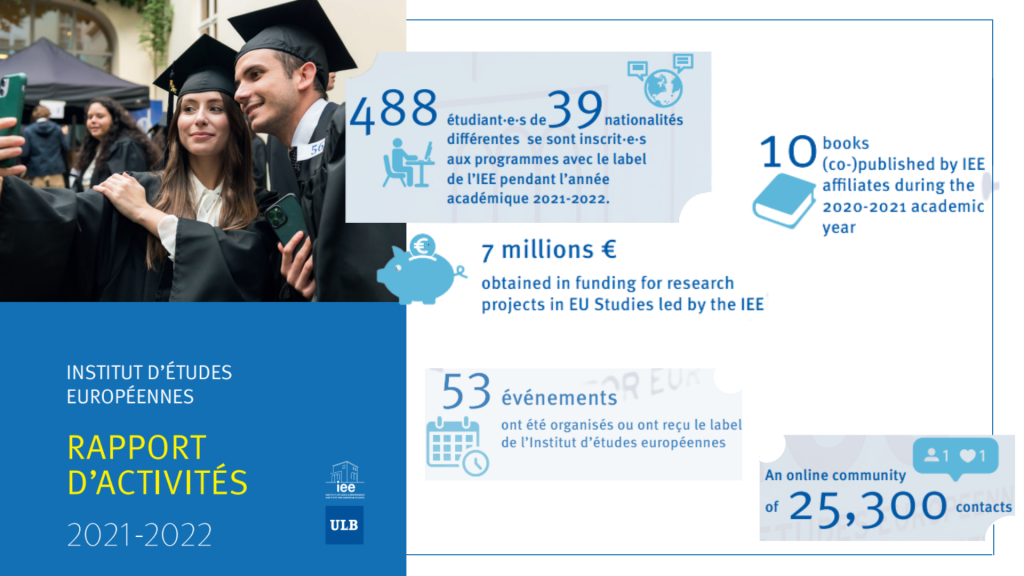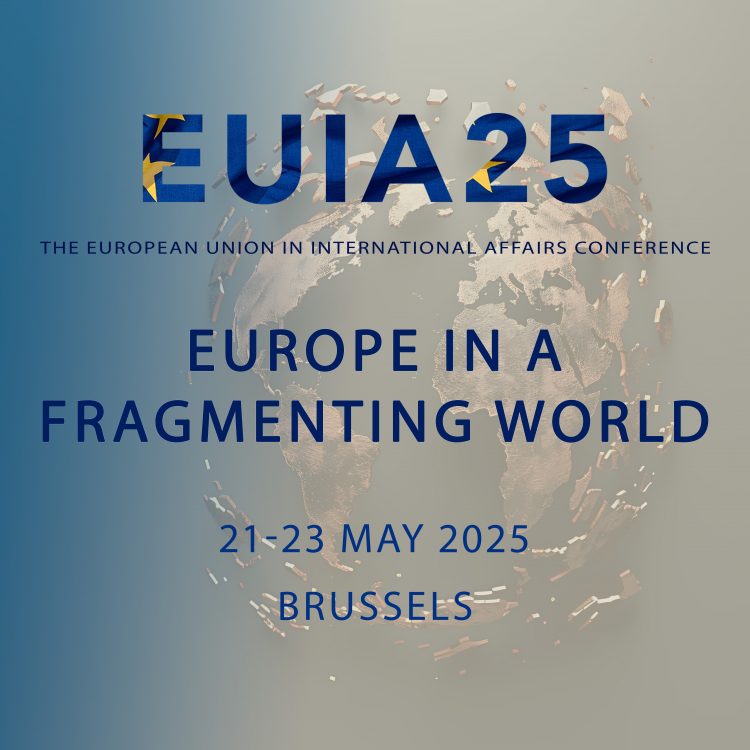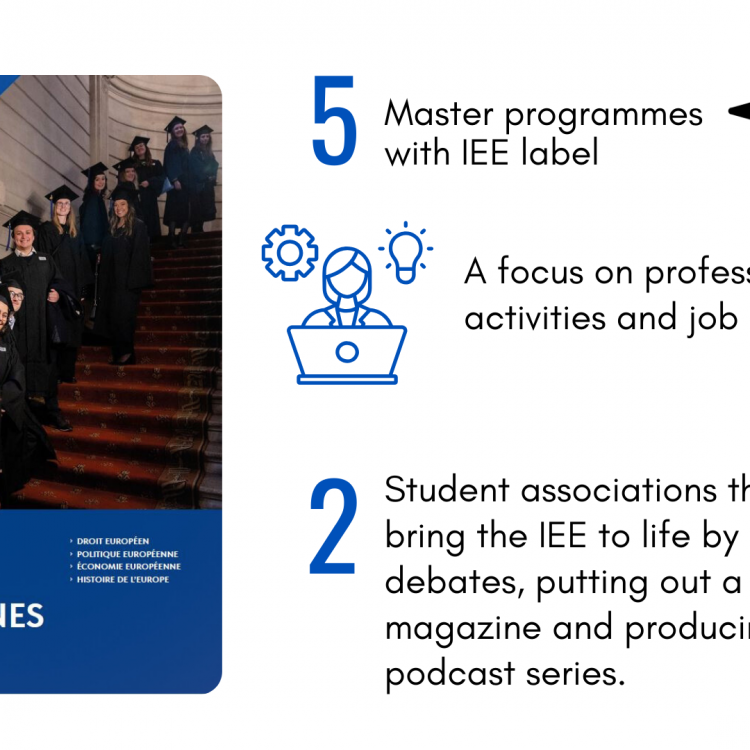Between COVID-19 and the invasion of Ukraine
This report provides an overview of the activities of the IEE’s affiliates during the year 2021-2022. It includes activities relating to major research projects, national, international and intra-European collaborations, our teaching programmes, and the many events organised with the IEE label.
The academic year 2021-2022 was marked by the severe effects of the health crisis generated by COVID-19 and by the Russian invasion of Ukraine. While the number of innocent victims on Ukrainian territory increases every day, as towns and villages are ravaged, in the EU, since 24 February, we have witnessed a massive mobilisation of citizens and the expression of many forms of solidarity, a solidarity that has often been lacking in the EU in recent years. We have also witnessed with emotion the mobilisation of students from the IEE and the ULB in the first weeks of March, who chose to show their support to the many people fleeing their country. In an effort to shed academic light on the turbulent and troubling news of this period, the IEE joined the Faculty of Philosophy and Social Sciences in a series of lectures attempting to explain, through cross-views, Russia’s aggression and its implications for Ukraine and Europe. In response to Russia’s war in Ukraine, heads of state and government have tried to speak with one voice. The future of many EU policies is at stake, with far-reaching consequences for the citizens of the Member States in a context of widespread inequality.
Inequality and the European Union
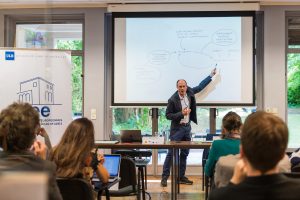
In terms of research, it is precisely the theme of inequality that has become central, not only to our academic exchanges, but also to our discussions with students in the context of the pandemic. To feed our reflections on this pressing issue, Professor Olivier De Schutter (UN Special Rapporteur on extreme poverty and human rights) was our guest speaker for the opening of the academic year 2021-2022 with the lecture “Can Europe
win the fight against poverty?
The theme of inequality will also be at the heart of the research and teaching activities of the next three years, as in 2021 the IEE has been selected as one of the winners of the Jean Monnet Centre of Excellence project of the European Union’s Erasmus Plus programme. Conceived following a collective and interdisciplinary dynamic, the EUqualis Jean Monnet Centre of Excellence project – coordinated by Prof. Amandine Crespy with Prof. Chloé Brière – brings together several affiliated members of the IEE. It was officially launched in May 2022 at the Interdisciplinary conference on European Advanced Studies (IDEAS), co-organised with the VUB and the University of Warwick. The first IDEAS conference brought together more than 150 participants from 26 countries and 60 academic institutions at the IEE. The theme of inequality was explored in 10 interdisciplinary panels.
Although the Member States have been trying to speak with one voice since February 24, the war in Ukraine has not put an end to the divisions between Member States on fundamental issues, such as values. It has only put these divisions in the background. The lack of respect for the rule of law in Poland and Hungary continues to be a major concern for both the European institutions and the citizens of these countries. While Poland has welcomed the largest number of Ukrainians to its territory, in both Poland and Hungary the dismantling of the pillars of liberal democracy has continued apace, despite the opposition and resistance from civil society. It is in this context that the IEE participated in the Milenium Festival organised in Brussels in May 2022 for the screening of the film Judges under pressure, alongside Polish judges Igor Tuleya and Monika Fracowiak and the producer of the documentary, Iwona Harris, for a rich debate with civil society actors and various associations of judges and human rights defenders in Belgium.
Interdisciplinary research on democracy and its challenges
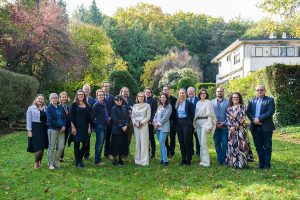
Still on the research front, it is the theme of the contestation of liberal democracy that emerged as a federating topic at the meetings of the IEE’s Research Committee in September 2021. In order to boost collective and interdisciplinary research, the IEE has taken the initiative to submit three European projects to the European Commission’s Horizon Europe call. In 2022, the Institute was awarded two European projects: RED-SPINEL and GEM-DIAMOND, both evaluated very positively in a highly competitive process and with a total budget of €7,263,204. Coordinated by Ramona Coman with the valuable support of the EEI team (Jozefien Van Caeneghem, Frederik Ponjaert and Maria-Isabel Soldevila), these two interdisciplinary and collective projects involve many IEE affiliates, both political scientists and lawyers. RED-SPINEL is a research project that brings together seven academic partners [1] and 4 non-academic partners[2]. The GEM-DIAMOND Joint Doctorate Marie Curie Network has been built on the legacy of the GEM project, coordinated by Prof. Mario Telo in the 2000s, and the GEM-STONES project, coordinated by Prof. Anne Weyembergh from 2015 to 2019. GEM-DIAMOND has enabled the recruitment of 16 doctoral fellows who will carry out their theses in co-supervision within the framework of a consortium led by the IEE-ULB and including five beneficiary universities[3] and several associated partners[4]. It is worth recalling that the first two iterations – GEM and GEM-STONES – have contributed to the training of more than 60 PhDs, graduating in co-supervision programmes between several European and non-European universities. With 16 doctoral students selected in the summer of 2022, GEM-DIAMOND is making a substantial contribution to the expansion of our network.
The dynamism of the IEE’s affiliated members and its team contributed greatly to these successes. The follow-up and valuable advice of the ULB Europe Unit also played a decisive role. The support of the ULB and FNRS authorities for academics involved in setting up European projects also bore fruit.
The new projects have also enabled the IEE to expand its network and national, intra-European and international collaborations. In this respect, with the VUB, the IEE continued to organise the European Union in International Affairs conference. The IEE and the ULB continued their exchanges with Waseda University in the framework of the EU-Japan Forum, coordinated by Professors François Foret and Emmanuelle Bribosia, with the support of Frederik Ponjaert. In addition, there is the increasingly fruitful collaboration with the College of Europe, one of the priorities of the IEE presidency. The rapprochement launched in 2020 by Prof. Ramona Coman and Prof. Olivier Costa (Director of the Politics Department of the College of Europe) has been extended in 2021-2022. A second debate between students of the College and the IEE was organised, with the aim of examining the proposals that emerged from the Conference on the Future of Europe. After a first preparatory meeting in Bruges in December 2021, the students met at the IEE in June 2022 for a rich and stimulating debate, followed by a convivial garden party. In addition, the collaboration with the Wiener Anspach Foundation will continue. In 2021-2022 the Ganshof van der Meersch Chair was awarded to Professor Paul Betts (Oxford University), who gave a public lecture on March 10, 2022 entitled “A Re-Civilising Mission: The Cultural Reconstruction of Europe after 1945”, as well as a series of seminars attended by students in the Advanced Master in Interdisciplinary EU Studies.
Our students: at the centre of our actions
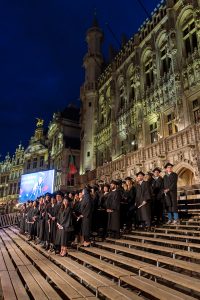
In terms of teaching, the IEE welcomed 488 students in 2021-2022 in the various IEE-labelled Master’s programmes in European Studies. In order to facilitate access to employment and professionalisation – which are at the heart of our programmes – the Institute has maintained its mentoring activities for European Studies students. This programme – organised by Maria-Isabel Soldevila – was made possible thanks to the support of the Fonds d’encouragement à l’enseignement en études européennes project coordinated by Prof. Nicolas Verschueren. It should also be noted that in 2021-2022 the teaching activities of the IEE were enriched by four Jean Monnet projects (modules, chairs, projects) coordinated by IEE affiliates. IEE members also participated in two Jean Monnet network projects, coordinated by partner universities.
In terms of continuing education, the IEE continued its collaboration with the National Institute of Public Administration in Bucharest. The 360° in EU affairs summer school was organised for the third consecutive year by Professor Ramona Coman, with the invaluable support of the Continuing Education Department of the Faculty of Philosophy and Social Sciences and the IEE. This third edition allowed us to renew the partnership with the NCCU Taiwan, allowing 10 students from Taipei to join us in Brussels. This third edition also benefited from the support of the European Alliance CIVIS. Thanks to this, students from 7 partner universities were able to interact with academic members affiliated to the IEE and many professionals from EU institutions, the Council of Europe, NATO and OACPS invited.
In 2021-2022, the IEE continued its close collaboration with Eyes on Europe and the student association SAIES. As in previous years, the Institute supported the participation of European Studies students in the Simulation du Parlement européen Canada-Québec-Europe (SPECQUE). Throughout the year, SAIES and Eyes on Europe brought a fresh perspective on European issues by inviting personalities from the European political and academic community to the IEE. More importantly, SAIES and Eyes on Europe contribute in a fundamental way to the socialisation of European Studies students, be it during lectures and debates or around a picnic or the participation in the ULB 10 km race. The debates between students of the College of Europe and the IEE, coordinated by SAIES with the presidency of the IEE, are a good example of this.
Alumni relations: an institutional priority
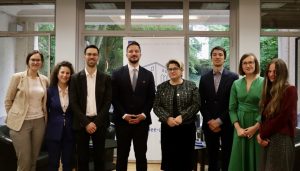 The link with our Alumni remained a priority. During the academic year 2021-2022, the new system of a collective and rotating presidency was put in place. Many IEE graduates responded to our invitation. It is always with great pleasure and emotion that we welcome them to the Institute, as they are eager to give back to the IEE, as they say,a little of what the Institute has been able to contribute to their education. Three groups of co-chairs were quickly formed, each with between 5 and 8 representatives, to energise the network over an 18-month period (September 2021-February 2022, March-August 2022 and September 2022-February 2023). Each presidency played an extremely active role, participating not only in the mentoring sessions – which allow new generations to benefit from the professional experience of graduates – but also in the IEE’s mission of plural and critical debate on current European political issues. Some noteworthy events are the session on the EU’s strategic autonomy in December 2021, organised by the first rotating co-presidency, and the meeting with the Romanian Ambassador to the EU, H.E. Iulia Matei, and the Montenegrin Ambassador, H.E. Petar Markovic (both IEE alumni), which took place in April 2022 on the initiative of the second Alumni co-presidency, with the Institute’s support. During the academic year 2021-2022, the IEE also had the honour of hosting the Prime Minister of Spain, Pedro Sanchez. On the eve of the European Council in June, the Spanish Prime Minister came to the Institute to meet the authorities, professors and some Alumni. It was an opportunity for him to recall his years spent at 39 Avenue Franklin Roosevelt and to collect his Master’s diploma in European Economic Studies, obtained at the IEE in 1998.
The link with our Alumni remained a priority. During the academic year 2021-2022, the new system of a collective and rotating presidency was put in place. Many IEE graduates responded to our invitation. It is always with great pleasure and emotion that we welcome them to the Institute, as they are eager to give back to the IEE, as they say,a little of what the Institute has been able to contribute to their education. Three groups of co-chairs were quickly formed, each with between 5 and 8 representatives, to energise the network over an 18-month period (September 2021-February 2022, March-August 2022 and September 2022-February 2023). Each presidency played an extremely active role, participating not only in the mentoring sessions – which allow new generations to benefit from the professional experience of graduates – but also in the IEE’s mission of plural and critical debate on current European political issues. Some noteworthy events are the session on the EU’s strategic autonomy in December 2021, organised by the first rotating co-presidency, and the meeting with the Romanian Ambassador to the EU, H.E. Iulia Matei, and the Montenegrin Ambassador, H.E. Petar Markovic (both IEE alumni), which took place in April 2022 on the initiative of the second Alumni co-presidency, with the Institute’s support. During the academic year 2021-2022, the IEE also had the honour of hosting the Prime Minister of Spain, Pedro Sanchez. On the eve of the European Council in June, the Spanish Prime Minister came to the Institute to meet the authorities, professors and some Alumni. It was an opportunity for him to recall his years spent at 39 Avenue Franklin Roosevelt and to collect his Master’s diploma in European Economic Studies, obtained at the IEE in 1998.
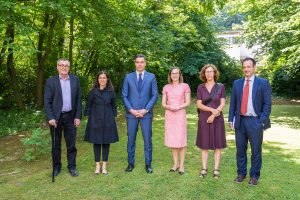
In terms of our third mission, contributing to the public debate, the IEE’s agenda has been rich in events. After two years of lockdown, it was a joy to see the Institute’s premises reopen. In 2021-2022 the IEE invited its members to the theatre. The new leadership team wanted to bring a cultural dimension to our political, historical, economic or legal views of Europe. The IEE joined forces with the Théâtre National Wallonie-Bruxelles to accompany a performance by Cédric Eeckhout (actor and director) entitled “The Quest”. The performance was followed by a debate entitled “A chacun-e son Europe?” with the participation of Prof. Emmanuelle Bribosia, Prof. François Foret and Marylou Hamm, researcher in political science.
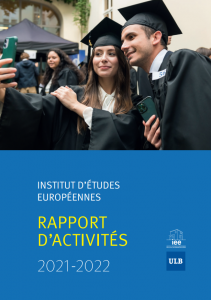
Read the annual report of the Institut d’études européennes of the l’ULB,
academic year 2021-2022
Thankfully looking back
This foreword is the last one from our pen, because, having been elected in June 2019, we are entering the last year of our mandate.
As mentioned at the time of our election and re-election, during these four years we wanted to collectively define research at the IEE and more particularly to bring out interdisciplinary projects, to deepen the link with research centres, to organise an annual cycle of joint conferences and to launch activities combining a cultural approach in our reflections on European construction. Our objective has been to obtain new funding such as Horizon Europe, ARC and Mini ARC interdisciplinaires or other. In terms of teaching, we wanted to continue the tradition of the IEE as a place of high-level training, to ensure the international influence of our programmes, to perpetuate and improve the initiatives launched by the previous management team, particularly in terms of professionalisation and mentoring, and to ensure better pedagogical coordination with the partner Faculties as well as better consultation of the students and members of the academic and scientific body concerned. To be able to organise our teaching activities, we have devoted some of our energy to obtaining new Jean Monnet or FEE funding. At the level of national, international or intra-European collaborations, we have made our modest contribution to the implementation of pre-existing partnerships – notably with the VUB, LUISS University and Waseda University. We have also sought to develop new collaborations, in particular with the College of Europe and the European University Institute in Florence.
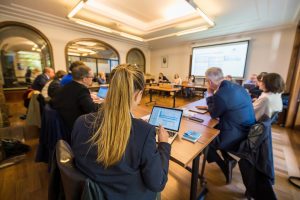
Before concluding, we would like to recall that the strength of the IEE lies in the dynamism of its three bodies – academic, scientific and student. In 2021-2022, the IEE has 50 academic members, 43 researchers with a doctoral or post-doctoral mandate, 15 scientific collaborators and several visiting researchers among its affiliated members. Since the beginning of our mandate, a central role has been played by the administrative team, which ensures with professionalism and determination the implementation of interdisciplinary teaching and research activities (Michela Arcarese, Dominique Dembour, Olga Minampala and Françoise Vanden Broeck) and contributes to the setting up of new interdisciplinary and collective projects and the dissemination of research (Jozefien Van Caeneghem, Frederik Ponajert and Maria-Isabel Soldevila).
We would like to express our gratitude to all those who have collaborated closely with us during this year 2021-2022 and the previous three years, whether they belong to the academic, scientific or administrative body.
A special thanks goes to the Alumni for their dynamism and their unfailing support to our missions and activities.
Our warmest thanks go to our active and creative students, who are always present at our activities and ready to make a substantial contribution to our missions.
Thank you all for your precious collaboration and for your trust over the (nearly) past four years!
Ramona Coman (President), Emmanuelle Bribosia (Vice-President) and Nicolas Verschueren (Director).
December 2022.
[1] ULB, Libera Università Internazionale degli Studi Sociali Guido Carli, Universiteit van Amsterdam, Universitatea Babeș-Bolyai, HEC
[2] – Peace Action, Training and Research Institute in Romania, Milieu Consulting, Magyar Helsinki Bizottság / Hungarian Helsinki Committee and Stichting Nederlands Instituut voor Internationale Betrekkingen Clingendael
[3] Libera Università Internazionale degli Studi Sociali “Guido Carli” (LUISS), University of Amsterdam (UvA), University of Copenhagen (UCPH), Babeș-Bolyai University (UBB), University of Paris 1 Panthéon-Sorbonne (Paris1)
[4] University of Geneva (UNIGE), University of Warwick (UoW), Waseda University (WUT), Université Laval (UL), Fundação Getulio Vargas (FGV), Istituto Affari Internazionali (IAI), The Transatlantic Foundation (TF), EGMONT – The Royal Institute for International Relations (EGM), PATRIR – Peace Action, Training & Research Institute gf Romania (PAT), Centre for European Policy Studies (CEPS) and Fédération internationale des ligues des droits de l’homme (FIDH).
